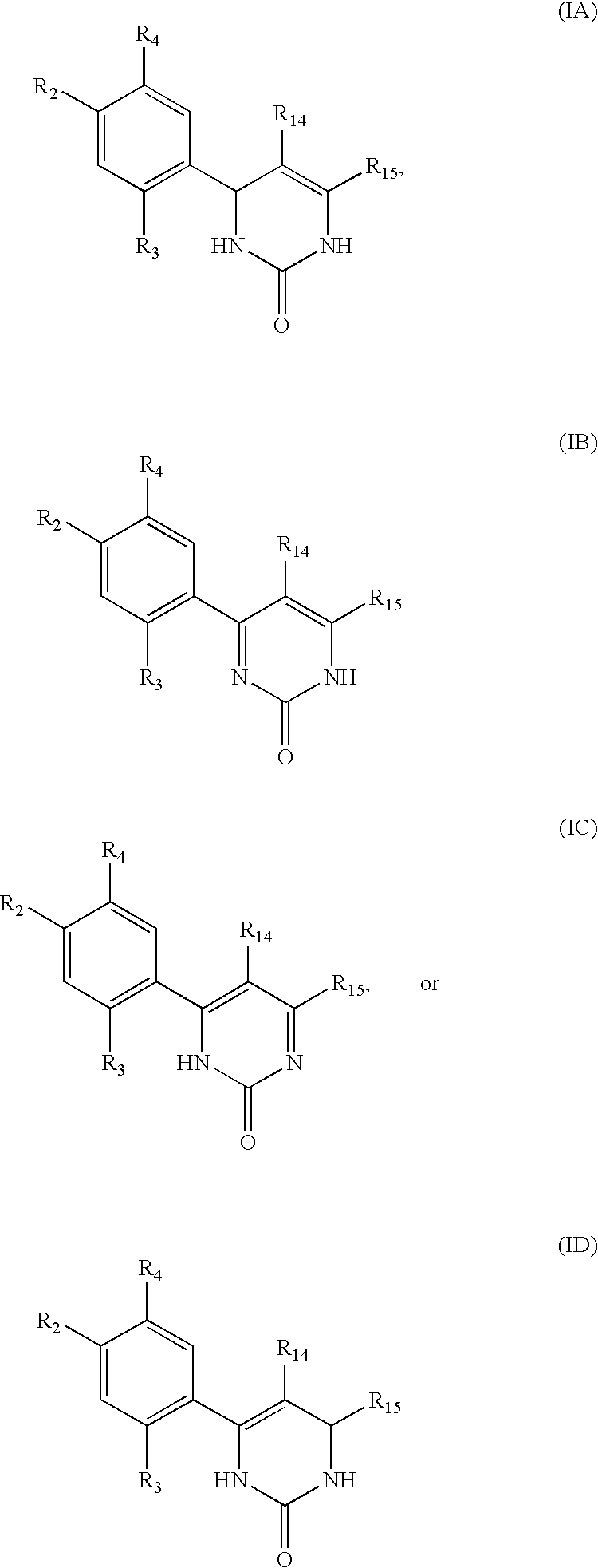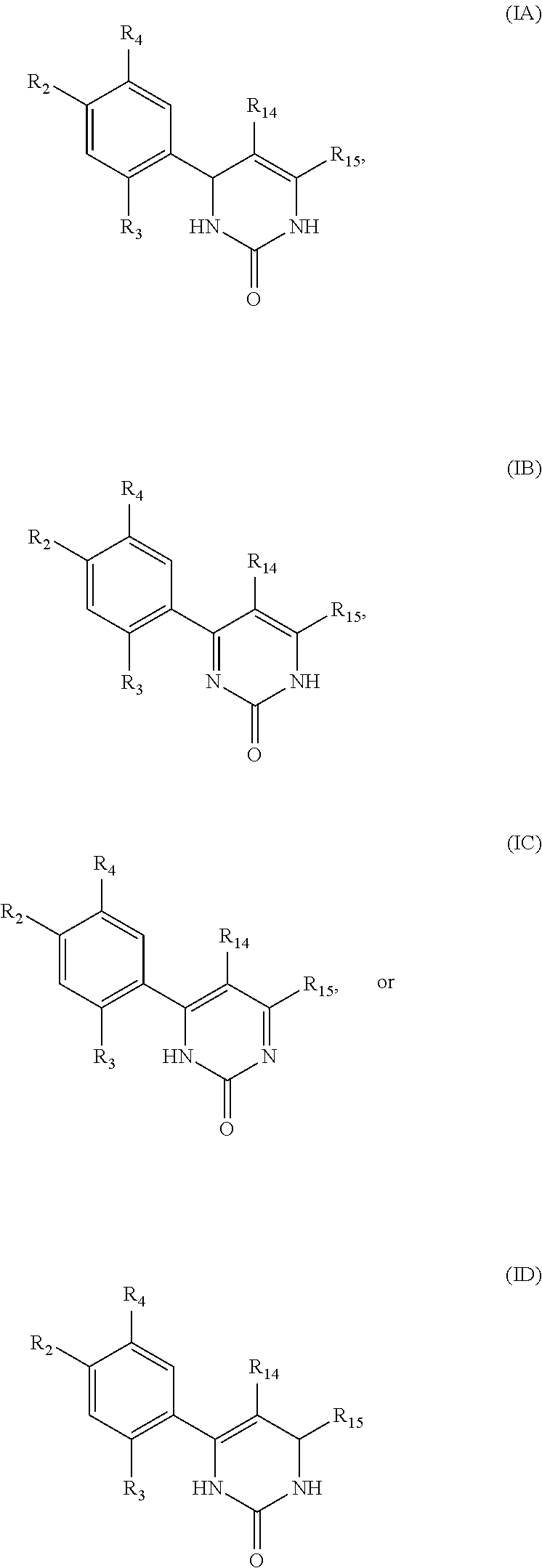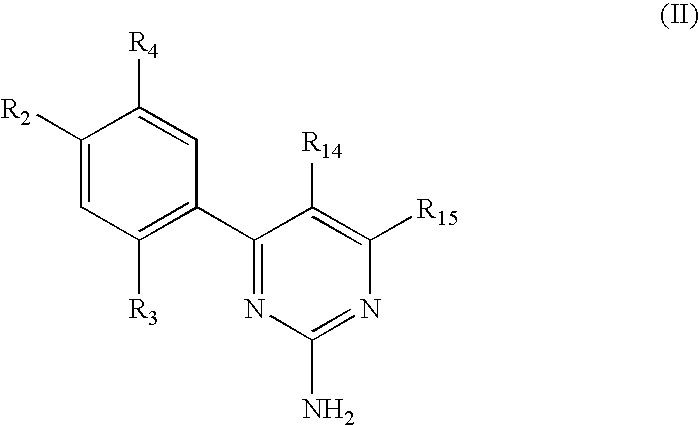Triazinone and diazinone derivatives useful as HSP90 inhibitors
a technology of diazinone and triazinone, which is applied in the direction of antibacterial agents, drug compositions, antiparasitic agents, etc., can solve the problems of unsatisfactory current chemotherapy, unfavorable treatment effect of patients with cancer, and inability to fully effect a therapeutic agent that acts on one molecular targ
- Summary
- Abstract
- Description
- Claims
- Application Information
AI Technical Summary
Benefits of technology
Problems solved by technology
Method used
Image
Examples
example 1
Ethyl 4-(2,4-dihydroxy-5-isopropylphenyl)-6-methyl-2-oxo-1,2,3,4-tetrahydropyrimidine-5-carboxylate
[0509]
[0510]A solution of β-keto ester (5 mmol), aldehyde (5 mmol), urea (7.5 mmol), and conc. HCl (1˜2 drops) in EtOH (20 mL) was heated under reflux overnight. After cooling, the reaction mixture was poured onto crushed ice (100 g). Stirring was continued for several min, the solid products were filtered, washed with cold water (2×50 mL) and a mixture of EtOH:H2O, 1:1 (3×20 mL). The solids were dried and purified by column chromatography with 5% MeOH in dichloromethane to give yellow solid. This solid was hydrogenated by balloon pressure of hydrogen at 55° C. in THF:MeOH (2:1) for 3 h. After purification by column chromatography with 5% MeOH in dichloromethane, Compound 1 was obtained.
[0511]Chemical Formula: C17H22N2O5; Exact Mass: 334.15; Molecular Weight: 334.37
[0512]ESMS calcd. for C17H22N2O5 334.2; Found: 335.2 (M+1)+.
[0513]H-NMR (DMSO-d6): 9.12 (s, 1H)), 8.9 (m, 1H), 6.9 (m, 1H)...
example 2
4-(2,4-Dihydroxy-5-isopropylphenyl)-6-ethyl-3,4,6,7-tetrahydro-1H-pyrrolo[3,4-d]pyrimidine-2,5-dione
[0514]
Ethyl 4-(2,4-bis(benzyloxy)-5-isopropylphenyl)-6-(chloromethyl)-2-oxo-1,2,3,4-tetrahydropyrimidine-5-carboxylate (A)
[0515]A solution of β-keto ester (5 mmol), aldehyde (5 mmol), urea (7.5 mmol), and conc. HCl (1˜2 drops) in EtOH (20 mL) was heated under reflux overnight. After cooling, the reaction mixture was poured onto crushed ice (100 g). Stirring was continued for several min, the solid products were filtered, washed with cold water (2×50 mL) and a mixture of EtOH:H2O, 1:1 (3×20 mL). The solids were dried and purified by column chromatography with 5% MeOH in dichloromethane to give A as yellow solid.
[0516]
4-(2,4-Dihydroxy-5-isopropylphenyl)-6-ethyl-3,4,6,7-tetrahydro-1H-pyrrolo[3,4-d]pyrimidine-2,5-dione (Compound 2)
[0517]A solution of A and ethyl amine (2 M solution in methanol, 3 eq) in MeOH was heated for 4 days at reflux. After cooling, this solution was hydrogenated by...
example 3
4-(2,4-Dihydroxy-5-isopropylphenyl)-6-ethyl-3,4,6,7-tetrahydro-1H-pyrrolo[3,4-d]pyrimidine-2,5-dione
[0521]
[0522]A solid of A without any solvent was heated for 10 min at 190˜200° C. After cooling, the corresponding dark brown solid was hydrogenated by balloon pressure of hydrogen at 55° C. in THF:MeOH (2:1) for 2 h. After purification by column chromatography with 5% MeOH in dichloromethane, Compound 3 was obtained.
[0523]Chemical Formula: C15H16N2O5; Exact Mass: 304.1; Molecular Weight: 304.3
[0524]ESMS calcd. for C15H16N2O5 304.1; Found: 305.2 (M+1)+.
[0525]H-NMR (DMSO-d6): 9.77(s, 1H)), 9.19 (d, 1H), 9.13 (d, 1H), 7.18 (s, 1H), 6.70 (s, 1H), 6.29 (s, 1H), 5.22 (s, 1H), 4.77 (m, 2H), 3.16 (m, 1H), 3.00 (m, 1H), 1.06 (m, 6H)
PUM
| Property | Measurement | Unit |
|---|---|---|
| weight percent | aaaaa | aaaaa |
| weight percent | aaaaa | aaaaa |
| weight percent | aaaaa | aaaaa |
Abstract
Description
Claims
Application Information
 Login to View More
Login to View More - R&D
- Intellectual Property
- Life Sciences
- Materials
- Tech Scout
- Unparalleled Data Quality
- Higher Quality Content
- 60% Fewer Hallucinations
Browse by: Latest US Patents, China's latest patents, Technical Efficacy Thesaurus, Application Domain, Technology Topic, Popular Technical Reports.
© 2025 PatSnap. All rights reserved.Legal|Privacy policy|Modern Slavery Act Transparency Statement|Sitemap|About US| Contact US: help@patsnap.com



